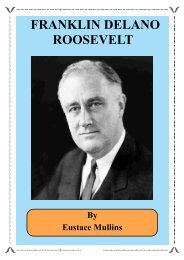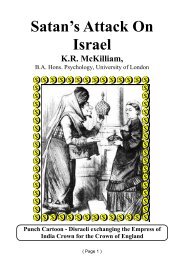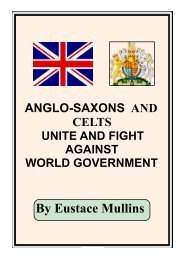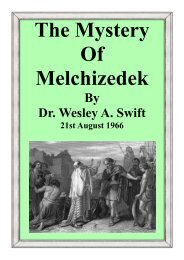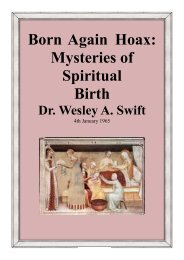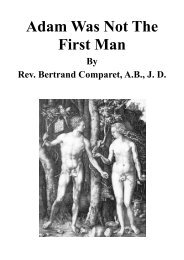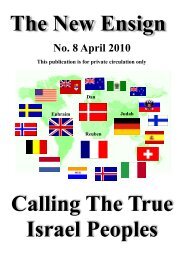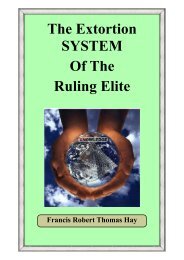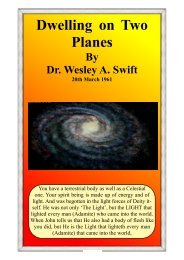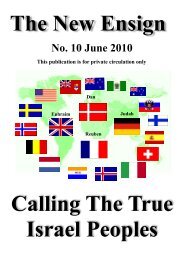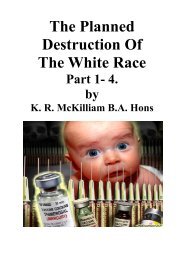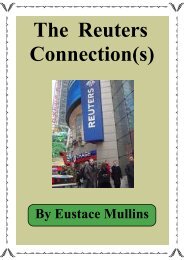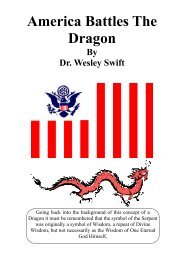Curse of Cannan - The New Ensign
Curse of Cannan - The New Ensign
Curse of Cannan - The New Ensign
You also want an ePaper? Increase the reach of your titles
YUMPU automatically turns print PDFs into web optimized ePapers that Google loves.
taxation imposed by the authority <strong>of</strong> the federal troops. Of a total population <strong>of</strong> sixty million,<br />
the ten Southern states had suffered five and one-half million casualties, roughly ten per cent;<br />
one-fourth <strong>of</strong> the male population was dead or incapacitated by 1865. It would seem impossible<br />
for even the people <strong>of</strong> Shem to go on after such losses, yet survive they did, even though the<br />
cruel twelve years <strong>of</strong> the Reconstruction Period was designed to ensure that none <strong>of</strong> them would<br />
survive.<br />
It is a fact <strong>of</strong> law that legislation enacted during periods <strong>of</strong> martial law is valid only during the<br />
period for which martial law is declared and sustained. Amazingly enough, the Thirteenth,<br />
Fourteenth, and Fifteenth Amendments have never been challenged on this basic premise <strong>of</strong> law.<br />
<strong>The</strong> Thirteenth Amendment abolished slavery, even though President Johnson informed Congress<br />
that they had no power to interfere with slavery; the Fourteenth Amendment changed the<br />
requirements for citizenship, even though Congress had no power to act on this question. Johnson<br />
urged the Southern states to reject the Fourteenth Amendment; he vetoed the four Reconstruction<br />
Acts, showing that the executive branch <strong>of</strong> the government was unalterably opposed to the<br />
excesses <strong>of</strong> the Radical Republicans in Congress.<br />
<strong>The</strong> Oxford Companion to Law states, "In the Middle Ages, martial law meant law administered<br />
by the Court <strong>of</strong> the Constable and the Marshal-it now means law applicable by virtue <strong>of</strong> the<br />
Royal Prerogative to foreign territory occupied for the time being by the armed forces <strong>of</strong> the<br />
Crown."<br />
Thus the federal troops who occupied the Southern states were exercising a Royal Prerogative,<br />
which had nothing to do with the Constitution <strong>of</strong> the United States-hence President Johnson's<br />
veto <strong>of</strong> the Reconstruction Acts. It was the exercise <strong>of</strong> absolute power over the population by a<br />
military <strong>of</strong>ficer who was directly responsible to the President. No martial law has been imposed<br />
in Great Britain since the seventeenth century. "Martial law may, exceptionally, be established<br />
within the State itself, in substitution for the organized government and administration <strong>of</strong> justice,<br />
when a state <strong>of</strong> war, or rebellion, an invasion, or other serious disturbance exists; in that event,<br />
justice is administered by its martial and military law tribunals."<br />
<strong>The</strong>re cannot be two governments exercising the same authority in the same area; when the<br />
military governments were established by the Reconstruction Acts in the ten Southern states<br />
from 1865 to 1877, no other government had sovereignty in those states; thus no legislation<br />
could be enacted except under the umbrella <strong>of</strong> martial law; therefore, when martial law ended,<br />
all legislation enacted under martial law was void.<br />
Black's Law Dictionary says <strong>of</strong> martial law, "military authority exercises control over civilians<br />
or civil authority within domestic territory. Ochikubo v. Bonesteel, D.C.Cai. 60 F supp. 916,<br />
928, 929, 930."<br />
Webster's Dictionary says <strong>of</strong> martial law, "From Mars, Roman God <strong>of</strong> War. Law applied to all<br />
persons and property in occupied territory by the military authorities." <strong>The</strong> Oxford English<br />
Dictionary says <strong>of</strong> martial law, "1548 Hall Chron. HenIV 7b. He .... caused dyvers lustie men<br />
to appele divers older men upon matters determinable as the common law <strong>of</strong> the court marcial."<br />
OED further states <strong>of</strong> martial law, "That kind <strong>of</strong> military government <strong>of</strong> a country or district, in<br />
which the civil law is suspended and the military authorities are empowered to arrest all suspect<br />
persons at their discretion and to punish <strong>of</strong>fenders without formal trial. 1537 Hen VIII. Let, Dk<br />
Norfk St Papr ii 537 .... <strong>The</strong> cours <strong>of</strong> our lawes must give place to the ordinaunces and estates<br />
marciall, our pleasure is that you shall cause such dredful executions to be done on a good nombre<br />
<strong>of</strong> thinhabitantes o euery towne, village and hamlet that have <strong>of</strong>fended in this rebellion and they<br />
may be a ferefull spectacle to all other hereafter, that wold practise any like matter." <strong>The</strong> OED<br />
quotes Wellington as saying in 1851, on military law in Hansard, "Martial law was neither more<br />
nor less than the will <strong>of</strong> the general who commands the army. In fact, martial law meant no law<br />
at all. "<br />
( Page 85)



